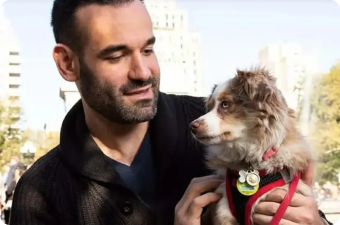This week I leined (read for the congregation) the Torah portion of Lech Lecha, the third Torah portion, where Abraham leaves his father’s land and heads to what becomes Israel.
This was, I learned after, the first time the Jews at FCI Miami have had a Minyan (10 Jewish men) and read from the Torah in a long time. While we easily get a minyan on Friday night, some guys like to sleep-in on Saturday.
That’s understandable, as Monday-Fri they’re expected to be up at 6am and out the door by 7am, while “count” is at 10pm, meaning it’s difficult to get a long night’s sleep — and certainly tough to get a quiet and peaceful night’s sleep consistently.
However, with some extra encouragement by me and others, a few more guys showed up. Some were from my unit “G” and “GlassHouse”, and showed up to support… and to see the other Jews. (“Jews! Collect them all!”)
Lech Lecha is long — much longer than my bar mitzvah parsha, which is the only one I’ve leined, nearly 30 years ago. I was worried I wouldn’t be able to memorize all the vowels and musical notes, which are not written in the Torah scroll.
However, one thing prison gives you is a lot of time, and freedom from the distractions of a smartphone, and the many tasks and ideas you think and remember on the outside. Without a business to run day-to-day, or even the need to shop, schedule, etc., you have fewer invasive thoughts creeping in. It’s a lot easier to learn and memorize when you’re not thinking “Did I switch the laundry?” “I have to take the dog out.” “Is the moon really an alien space ship used to seed, monitor, and control Earth?”
The last one stills pops up from time-to-time, because — and I should have mentioned this days ago — the moon is here, in prison! The conspiracy deepens.
Despite starting out with a cracking voice and some nervousness, I was able to calm myself a few sentences in and go smoothly through the parsha. The same thing happens when I get back on stage doing standup after a period… a few jokes in and I’m in the flow. I had practiced and reviewed a lot, daily, and a lot the night before, but I was still relieved that it went well, and the guys in the minyan were excited and happy to have the Torah reading back, and to be able to be called to the Torah for an Aliyah.
One nice thing about being able to do this in prison is the lack of desire to impress people — while it’s nice to be complimented, which happened in Ashkenaz and Sphardic renditions (“Yaasher Koach” “Chazak U’Baruch”) that wasn’t the motivation as it would likely have been at least in part “on the streets”. I wanted to do this because I’ve always regretted not really getting to know the “pshat”, the plain text of the Torah, the foundation of Judaism, and prison affords the time to learn.
Learning to lein makes it much easier to remember and to understand the stories. You start to read the lines with emotion, and to understand, at least sometimes, why the musical notes change, and how one story reflects or results in another. There is a beautiful symmetry and poetic cause-and-effect in the Torah’s stories, which are meant to be understood on multiple levels. When Sarai (Sarah) becomes hurt and negative towards Hagar, her handmaiden whom she gives to Abraham to have a child (Ishmael, father of Islam) the notes suggest that this negativity will have disastrous consequenses down the line — or they simply fortell the rift, and surely some commentaries say Sarah saw this and tried to distance them.
The musical notes add a richness to the story, and highlight the significance of characters, choices, actions, and turns of events. It took 41 years to “get” this, but it’s really interesting… It would be great to learn more about why certain words get certain musical notes… To my knowledge, nobody’s “translated” the notes atop the English and I wonder what that would look like and how it might help enrich our understanding. Probably there’s commentary on them… I’ll ask around.
Because Lech Lecha is long, I had to speed quickly through the last few Aliyot so that there would be time for Musaf and…kiddush (the wine (grape juice in prison) and meal after services)!
Jay, the guy who accidentally got a haircut that made him look like Hitler (whoops!), which is not the thing that landed him in prison, made an incredible “no bake” fruit cake from iced oatmeal cookies and some apples left over from chow. Everyone agreed it was legitimately one of the best non-dairy cakes they’d ever had.
David, who guided me on my second day to get laundry and shop commisary, made a great tuna — each week he changes it up a bit. It’s as good as any tuna you’d find on the streets.
I’ll probably assemble a “Kosher Prison Cookbook” for the kicks… maybe mail them out and encourage people to donate to support prisoners. “To make this, you’ll need a plastic bowl, spork, dubious cookies from commisary, an apple someone smuggled out of chow hall in their pants, two chocolate bars from the Clinton administration, a handful of macaroons from two passovers ago, and a prison sentence of 2 months or greater… We’ll be cooking it with hot water, because that’s all we’re allowed.”
The monotony and slowness of prison makes guys hungry for creative output and change. And cake!
Shabbat is my one day where I might near 2000 calories in a day. Otherwise, I’ve been hitting around 1200. I’m down a pants size, and will probably walk out with abs. Long-term such a diet wouldn’t be advisable, but I’ll make it work for a month. There’s not much choice…the kosher meals don’t provide many calories if you can’t eat bread regularly and commisary (tuna and rice) help but they limit your spend so you have to ration it out to last.
G-d willing I’ll be home soon — the dreams I’ve had about rib eye would make you blush…
However, on Shabbat we have smuggled Challah. I can’t tolerate carbs much these days, but on Shabbat I cheat and deal with the consequences… about a half a small roll of challah… We mostly, however, have matzah. The jolly imam who runs the Chaplaincy refuses to give the Jews Challah and gives matzah. There’s no logical or budget reason for this. Matzah and Challah cost the same and are readily available at many supermarkets in Miami and via delivery. The matzah says clearly on the box, “Not kosher for passover”. (Which is like selling a bathing suit with fine print that it can’t get wet.) The assistant chaplains, Jews, and all other non-Muslim people who use the chapel seem to agree he acts to obstruct non-Muslims, or at the very least refuses to do anything to make their worship seamless and easy.
He’s nice to me. He doesn’t ever agree to do anything…no Lunch & Learns with outside rabbis, no Xmas Tree and Menorah on display for the holidays, nothing… but he blows you off with a smile like a great government worker who knows that anything that goes wrong with anything he adds will be blamed on him.
However, the guys who’ve been here much longer than me are frustrated, as is his assistant chaplain, and it shows. Nobody can understand why he’s here — everone loves the female chaplain, a colorfully dressed and braided African reverend who preceded him here by years, and everyone agrees that she sees us all as souls and not inmates. She’s truly wonderful, and even her frustration is visible.
This week, most of the challah was moldy, the result of being tucked away months before. Some guys, hungry and out of commisary spend for the month, took the moldy bread back to their rooms, cutting around the mold.
Guys will speak with the warden and ask him to remedy this, because the assistant chaplains are not allowed to go around the main one. Military rules apply here — nobody goes over their boss’s head.
This week’s Parsha shows us how Avraham, our forefather, steps up against tremendous odds, over and over, to spread the truth, bring people to God, and defend and redeem captives. For this, God makes him the father of nations and calls him one of His prized possessions. It is a lesson that it is not enough to believe, not enough to complain, but that we must act, and we must do so against the “odds”, and we must encourage and instill others to do better and be closer to God.
This is true for all of us. Jews should not need to hide and smuggle moldy challah on Shabbat, no matter the mistakes they’ve made (or been wrongly accused of). Surely even the greatest criminal is worth one challah roll.
We can do better, and we will.
Shavua Tov. Love to all.
Ari


